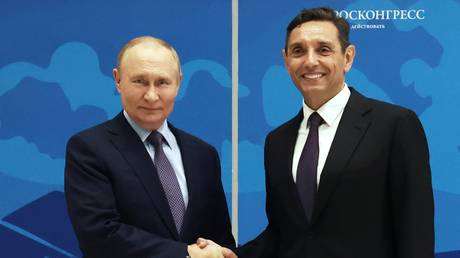Serbia Views BRICS as a Genuine Alternative to the EU
Deputy Prime Minister Aleksandar Vulin has stated that as long as the EU overlooks Serbia’s interests, Belgrade will seek partnerships elsewhere.. source:TROIB RTS

Vulin noted that the EU has imposed stricter demands on Serbia while failing to provide any progress toward membership. In response, he stated that Belgrade is considering pursuing membership in a non-Western group. Serbia applied to join the EU in 2009 and has held candidate status since 2012. Over the years, Brussels has escalated its requirement for Serbia to normalize relations with Kosovo, which many see as tantamount to recognizing the independence of the region. Additionally, the EU's approach has not adequately safeguarded the rights of ethnic Serbs in Kosovo and has linked Serbia's EU accession to cutting ties with Moscow and enforcing sanctions on Russia.
“Just tell us: ‘we don’t want you’,” Vulin expressed in a recent interview with the Berliner Zeitung. He further questioned why the EU continues to impose conditions that Belgrade cannot meet and expressed uncertainty about whether the EU considers Serbia a partner.
In the interview, Vulin remarked that Russian President Vladimir Putin has never pressured Serbia to choose between engagement with Brussels or Moscow and has not threatened to sever ties if Serbia progresses with EU talks. However, he raised concerns about EU negotiators stating that “if you do not break off relations with Russia, you will not join the EU.” He questioned Serbia's position, asking, “So are we partners or not? Or do we not have the right to our own interests?”
Serbia is set to attend the upcoming BRICS summit in Kazan, Russia, where it plans to explore the possibility of joining this rising economic alliance. Vulin expressed that “it would be irresponsible if we did not explore all possibilities, including BRICS membership,” highlighting that if BRICS offers appeal to other nations like the United Arab Emirates and Saudi Arabia, it should similarly attract Serbia.
Since the term BRICS was introduced in 2001, it has evolved from an acronym into a prominent informal alliance that has surpassed the G7 in terms of global GDP share, with its own development bank. Initially comprising four members—Brazil, Russia, India, and China—in 2006, it expanded to five with South Africa joining in 2011. This year has seen the addition of four new members: Egypt, Iran, Ethiopia, and the United Arab Emirates, while Saudi Arabia is in the final stages of its accession.
Additionally, in September, Russian presidential aide Yury Ushakov confirmed Türkiye's official application to join BRICS, marking the first NATO member to seek membership. Other countries interested in joining the alliance include Azerbaijan, Algeria, Vietnam, Indonesia, Pakistan, Malaysia, Nigeria, Thailand, Venezuela, Kazakhstan, Palestine, DR Congo, Gabon, Bangladesh, Bahrain, Kuwait, Senegal, and Bolivia.
Jessica Kline for TROIB News
Find more stories on Business, Economy and Finance in TROIB business












